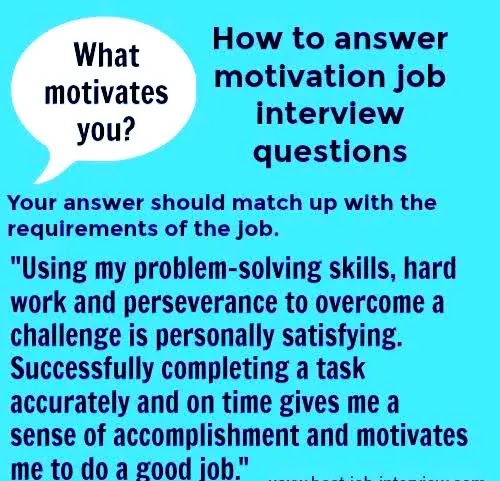There are many questions lurking in an interview. One of the most popular from recruiters is “What is your motivation (to apply here)?” Sounds harmless, a bit basic, but legitimate. But your answer has it all. The question is a wolf in sheep's clothing! If you don't sound honest, enthusiastic and credible (or even desperate), your chances of getting an application will be significantly reduced. How to cleverly answer the classic applicant question about motivation with formulations and examples...
Why do recruiters ask about motivation?
Asking candidates about their motivation for the job is part of the basics of an interview . HR managers use the question in numerous variants and formulations. For example:
- What is your motivation?
- What are your goals in this job?
- Why do you want to work for us?
- Why did you apply for this job?
- What excites you about this job? What drives you?
If HR managers ask this question , it is initially a good sign: Your CV , your qualifications and experience have obviously convinced you. They are no longer up for debate. What is at stake now is not so much your motivation (obviously: you want this job, otherwise you would not have applied). Rather, the interviewer is concerned with your goals IN this position!
huge difference! Future high performers aren't just looking for a job with an attached income. You want to make a difference, create value, master challenges and develop. And that's exactly what recruiters want to hear as an answer to the question. You are not just an employee, worker, vicarious agent - you want to turn the big wheel together with the team. If this motivation is lacking from the start, you will most likely have to carry it every time you hunt...
Insights into your attitude and way of working
When HR managers ask about motivation, they always try to get a better picture of you, your working style and personality . In essence, it is about your intrinsic motivation for your job. Conversely, means: "I want to work here because of the good pay" is not a smart answer to the question of what motivates you and drives you in the job.
The applicant question is underestimated by many. Unfortunately. You can clearly stand out from the crowd with your answer, provide insights into what drives you and show genuine passion for the job. The more enthusiasm that resonates in your voice, the more your eyes light up, the more convincing you come across. You don't need to motivate such employees - they're already on fire and running!
What is your motivation? - Good answers
Refer to the spot
Your motivation is your own personal drive. Most applicants choose formulations in the first person. Example: "I would like to use my knowledge, deepen it and develop myself personally and professionally." Or: "I want to support your team and be successful together." Or: "It motivates me to be able to use my creativity better." All legitimate answers and motives for a job. However, they are universal and therefore quickly appear trite and hollow. You will be more convincing if you make a reference to the company and the vacancy in the answer. Example:
The challenge of optimizing process management really appeals to me. I believe that there are cost savings of up to 20 percent lying dormant here. I know it won't be easy. But leveraging this potential spurs me on enormously. I have a lot of fun with such headbutts...
Describe your passion
Another simple way to convey your motivation for the job is through your passions. Tell and describe what your heart beats for and what excites you. Always related to the job and its tasks, of course. Be sure to stick to the truth. Experienced personnel managers unmask false passion by asking questions. A possible answer could be:
I always knew that I wanted to work as a programmer. The technology, the programming languages, the finished product - that fascinated me even at school, so that I developed my first small games in my free time. Your company as a market leader and driving force in game development gives me the opportunity to pursue this passion at the highest professional level. Honestly: I want to learn from the best and grow with you...
Be honest
Many applicants believe they have to say in the interview what recruiters want to hear. So they fabricate stories and invent some kind of motivation that seems to fit the company well and impresses HR managers. The approach is right, but the execution is wrong. Stick to the truth - and better think about what your motivation is beforehand. Be honest: Do you have life goals or professional goals? Should you!
Those who have goals are consistently more successful. In addition, goals help you to assess job offers better : Does the job really bring you closer to your goal? Does the job suit you? If you know this, you will automatically find a convincing and credible answer to the question "What is your motivation?"



Comments
Post a Comment